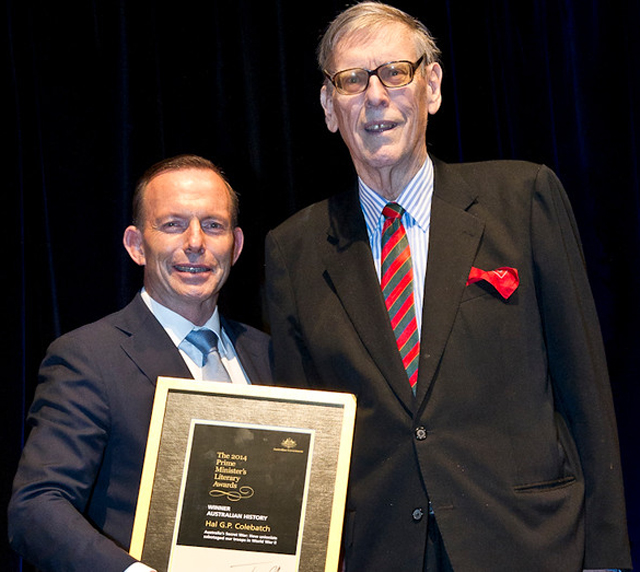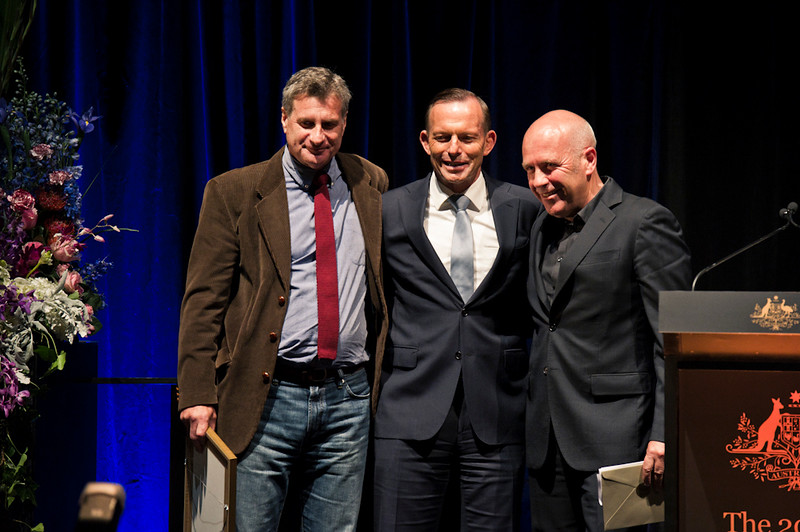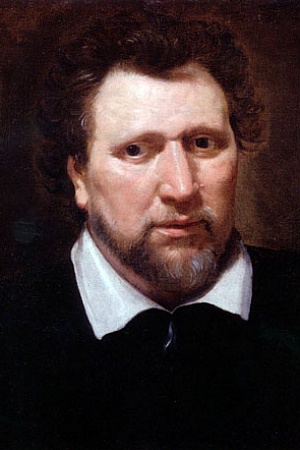News from the Editor's Desk
Vipers and whistleblowers
Much has been written about the Prime Minister’s Literary Awards (PMLAs), now in their seventh year. Advances was at the National Gallery of Victoria on 8 December when the winners were named. An opulent affair, it was televised by Sky News and SBS à la the Man Booker Prize. The Great Hall – deemed rather small by one distinguished literary editor from Sydney – was full of publishers and journalists, but also assorted politicians, festival directors, and senior bureaucrats. Happily, there were many shortlisted authors amid the potentates.
Kevin Rudd, who created these awards in 2008, tended to stay away, which always felt odd – and discouraging. This year Tony Abbott and his entourage were there in force. The prime minister gave every impression that the government will maintain these awards.
These are lucrative prizes, liberating for winners. Each of them is worth a total of $100,000 tax free (would that more literary prizes were similarly exempt). This year, three of the six prizes were shared – Australian History, Non-Fiction, and Fiction. This seems sensible, given the value of these prizes.
‘None of the winners’ speeches was as riveting as Michelle de Kretser’s in Brisbane last year ... but, with one exception, the speeches were generous, witty, thoughtful – and succinct’
None of the winners’ speeches was as riveting as Michelle de Kretser’s in Brisbane last year – when she lambasted the Rudd government (in front of Tony Burke, the immigration and arts minister) for its treatment of asylum seekers – but, with one exception, the speeches were generous, witty, thoughtful – and succinct. Melinda Smith – winner of the poetry award with her fourth collection, arrestingly titled Drag Down to Unlock or Place an Emergency Call – chose to dedicate her prize to Australian carers. (What a coup it was for new publisher Pitt Street Poetry to have two nominees on the five-strong shortlist.) Bob Graham, winner in the Children’s Fiction category, pointedly donated some of his prize money to the Asylum Seeker Resource Centre. Then came Fiction. Advances was seated on the HarperCollins table and can attest to the comprehensive shock that Steven Carroll received when he was named co-winner with Richard Flanagan. Flanagan had a long, pally tête-à-tête with the prime minister, then announced that he intended to donate his prize money ($40,000) to the Indigenous Literacy Foundation, a popular gesture.

Prime Minister Tony Abbott and Hal G.P. Colebatch
Hal G.P. Colebatch – a surprise co-winner in the Australian History category – gave a rancorous and interminable speech about wartime traitors and unionists. One person seated on our table remarked, ‘Well, we don’t need to read the book – we’ve just heard it.’
In the days that followed, thanks largely to Stephen Romei (literary editor of The Australian), we learned much more about the judging process and the extent of the political intervention. Not for the first time, a prime minister had overturned a jury’s recommendation; but on this occasion judges were prepared to go on the record. Ann Moyal told Susan Wyndham (Sydney Morning Herald) that she was totally opposed to favouring Colebatch’s ‘poorly constructed and poorly written’ book. More ominously for the officials, an enraged Les Murray went even further. Murray (one of three poets determining the Fiction award) revealed that the judges had unanimously recommended Steven Carroll’s A World of Other People as the winner, only to learn on the night that Tony Abbott had chosen Flanagan’s The Narrow Road to the Deep North as co-winner. Murray told Romei: ‘I was shocked that they went behind the scenes and worked a swifty.’ He also indulged in a few intemperate asides. Of ‘the Tasmanian fellow’s’ novel, he said: ‘It is a pretentious, stupid book.’ Then, Christmas upon us, he declared that ‘The literary scene is such a nest of vipers.’
The authorities tried to restore order by reminding the judges of the confidential nature of the judgements. One wag opined that the horse had probably bolted. Mixing our metaphors, Advances suspects that Les Murray is one whistleblower who is unlikely to be corralled.
Louise Adler – chairwoman of the judging panel – offered an extraordinary defence of the prime minister’s right to ignore the judges’ decision. ‘These are not Louise Adler’s literary awards or Les Murray’s literary awards – they are the Prime Minister’s literary awards,’ she told Stephen Romei. Have we really come to this? Taxpayers fund these awards: why should they be in a politician’s personal gift? Literary fiction is hardly Mr Abbott’s area of expertise. Did he read all five novels before honouring Flanagan’s book? And what of the judges? What of their expertise? Why would anyone now serve on the PMLA panel on such terms?
 Steven Carroll, Tony Abbott, and Richard Flanagan
Steven Carroll, Tony Abbott, and Richard Flanagan
Brouhahas aside, the PMLAs are a lucrative and galvanising reality. It’s important for a wealthy and cultivated nation like Australia to have awards of this kind. Only the current dilatoriness and unpredictability of these prizes prevent them from gaining widespread stature and traction. They should transcend the Miles and the Stella in importance and coverage, but at present they don’t. Announcing the PMLAs a fortnight before Christmas robs them of the commercial clout that would be welcomed by writers and an industry that has done it tough in recent years and that would benefit from a timely, well-publicised ‘PMLA boost’ in October or early November. At present these awards reward and gratify a number of writers, but the effect should be more diffuse, with major benefits for booksellers, publishers, and readers.
Clive James in his element
For someone who is gravely ill, Clive James is in remarkably fine literary fettle – irrepressible indeed, as we can tell from his mordacious poem ‘A Silent Speech by Julia Gillard’ (an Editor’s choice, we should note, not the poetry editor’s). James’s writings on the great poets – Auden, Bishop, Larkin, Montale et al. – remain essential reading for any young poet. Now we have a new compilation: Poetry Notes 2006–2014 (Picador). Geordie Williamson, who reviews the book on page 26, notes that ‘a great critic can reawaken a dormant sense of wonder for what poetry can do’.
Jolley Prize
The ABR Elizabeth Jolley Short Story Prize is the country’s principal short story prize, and we are delighted to be able to present it again in 2015 (with generous support from ABR Patron Ian Dickson). Total prize money will be $8,000 (the winner receives $5,000). As with all our prizes, the Jolley Prize is open to writers anywhere in the world (stories must be in English). Authors can enter online. See our website for more details.
Short story writers will have until 1 May to enter. The judges are Amy Baillieu, Sarah Holland-Batt, and Paddy O’Reilly. The winner will be announced at a suspenseful ceremony during the Brisbane Writers Festival (3–6 September 2015).
Lovers of the shorter form might be interested in joining our first cultural tour: the ABR Brisbane Writers Festival Tour, your chance to be part of the Jolley Prize ceremony. Spend a few days meeting writers and attending special ABR events. More details will follow early next year, but meanwhile reserve your place: This email address is being protected from spambots. You need JavaScript enabled to view it..
Free ABR Online subscriptions
Support from ABR Patrons has transformed the magazine since 2010, and now enables us to offer 100 free one-year subscriptions to ABR Online to those aged twenty-one and under.
All you have to do is phone ABR on (03) 9699 8822 or email Business Manager, Grace Chang, at This email address is being protected from spambots. You need JavaScript enabled to view it.. We will need date of birth verification, and terms and conditions apply. Readers and subscribers who know someone who might be interested in this special offer are encouraged to notify them. It is a great way to introduce young readers – especially students – to the magazine. Be quick, though: these complimentary subscriptions will be snapped up early in the New Year.









Leave a comment
If you are an ABR subscriber, you will need to sign in to post a comment.
If you have forgotten your sign in details, or if you receive an error message when trying to submit your comment, please email your comment (and the name of the article to which it relates) to ABR Comments. We will review your comment and, subject to approval, we will post it under your name.
Please note that all comments must be approved by ABR and comply with our Terms & Conditions.